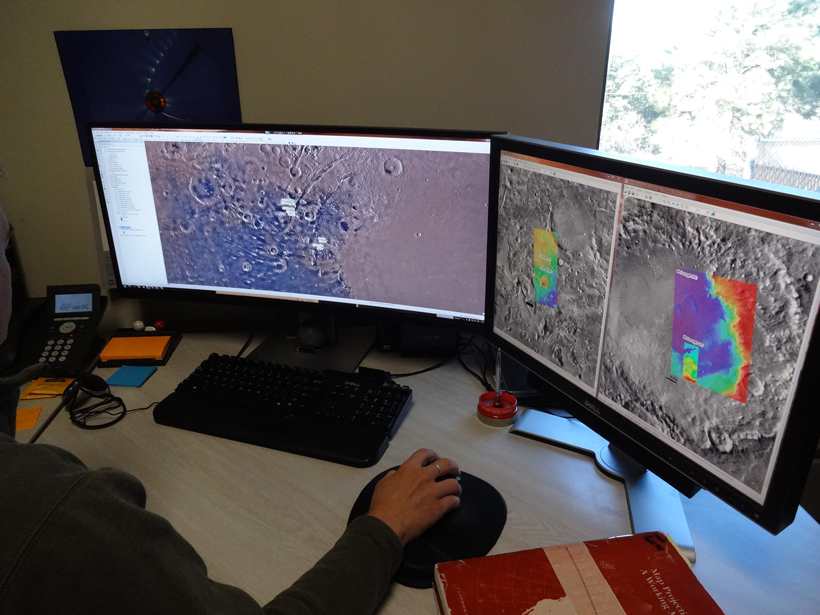Planetary science missions are returning data at an unprecedented rate. The NASA Planetary Data System (PDS) now provides nearly a petabyte of data, and these data are used daily by scientists worldwide for science research, mission planning, education, and outreach. New science questions, analysis methods, and data synthesis and visualization tools are continually being developed, necessitating regular consultation between users and tool developers.
Data synthesis and visualization tools are continually being developed, necessitating regular consultation between users and tool developers.
Scientists discussed these and related topics at the 2nd Planetary Data Workshop in June in Flagstaff, Ariz. The goal of the workshop was to bring together planetary scientists, data providers from current and recent planetary exploration missions, data archivists, and software experts to exchange ideas on current capabilities of and future needs for planetary research and data analysis tools.
The workshop gathered 108 scientists from across the globe. Twelve NASA and non-NASA data providers and missions were represented. The workshop featured almost 20 hours of hands-on training and how-to presentations for acquiring, processing, and working with a variety of digital planetary data.
Workshop themes included the availability of planetary data (information on how data are found, downloaded, processed, and used for cartography and scientific analysis), trends in data storage and online access, analysis and visualization tools using current and new algorithms and methods, and information on publicly available derived data products and services (e.g., geographic information systems). Participants received updates on PDS4, the next-generation planetary archive standard, from PDS representatives. The updates were discussed in light of the new data-archiving requirements set in place by research programs government-wide. Mission representatives summarized status and plans for their data archives and delivery services.
Attendees also discussed services such as the Planetary Geologic Mapping Program, Regional Planetary Image Facilities, and the community’s Integrated Software for Imagers and Spectrometers. A spirited discussion centered on the need for planning and assessment of planetary cartography research.
More work is needed to address the challenges imposed by “big data” and new technologies.
Dan Crichton of the Jet Propulsion Laboratory led the discussion of future needs in data analysis. The discussion emphasized data science that should include scalable architectures and development of new analytic approaches for collecting, managing, and using the growing volumes of digital planetary data.
Participants agreed that more work is needed to address the challenges imposed by “big data” and new technologies. Another workshop to continue this discussion is now being planned. Information will be available on the Planetary Data Workshop website.
The second planetary data workshop was facilitated by the Lunar and Planetary Institute of the Universities Space Research Association. The meeting website at the Astrogeology Science Center of the U.S. Geological Survey provides abstracts, presentations, and tutorials.
—Lisa Gaddis and Trent Hare, Astrogeology Science Center, U.S. Geological Survey, Flagstaff, Ariz.; email: [email protected]
Citation: Gaddis, L., and T. Hare (2015), Status of tools and data for planetary research, Eos, 96, doi:10.1029/2015EO041125. Published on 14 December 2015.
Text not subject to copyright.
Except where otherwise noted, images are subject to copyright. Any reuse without express permission from the copyright owner is prohibited.
Text not subject to copyright.
Except where otherwise noted, images are subject to copyright. Any reuse without express permission from the copyright owner is prohibited.

